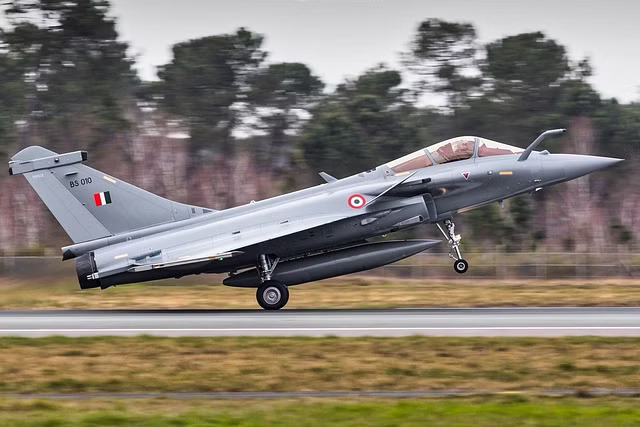In recent years, India has been actively bolstering its defense capabilities through strategic partnerships and indigenous manufacturing initiatives. One significant development in this realm is the planned establishment of a Maintenance, Repair, and Overhaul (MRO) facility by Dassault Aviation, a prominent French aircraft manufacturer. This facility aims to cater to the maintenance needs of India’s advanced combat aircraft, including the Rafale and Mirage-2000, operated by the Indian Air Force (IAF).
Context and Strategic Significance
The decision to set up the MRO facility in India underscores Dassault Aviation’s commitment to enhancing India’s self-reliance in defense manufacturing and upkeep. This move is part of a broader effort to localize the maintenance and repair processes of defense equipment, reducing dependency on external sources and enhancing operational efficiency.
Indian Air Force’s Advanced Fleet
Currently, the Indian Air Force operates a fleet of 36 Rafale jets, which were acquired to bolster its strategic capabilities. These jets represent the pinnacle of technological advancement in combat aviation, equipped with state-of-the-art features that significantly enhance India’s defense preparedness. Additionally, plans are underway for the Indian Navy to potentially procure 26 Rafale-M jets, further underlining the critical role of advanced aircraft in India’s defense strategy.
The Role of Dassault Aviation’s MRO Facility
The MRO facility will be strategically located near the Jevar International Airport in Noida, Uttar Pradesh. This choice of location is not incidental but rather a calculated move to optimize logistical support and operational efficiencies. By situating the facility close to a major international airport, Dassault Aviation aims to streamline the process of aircraft maintenance and ensure rapid response capabilities for the Indian defense forces.
Overhaul Capabilities
One of the primary functions of the MRO facility will be the overhaul of Mirage-2000 jets, which are integral to India’s air defense capabilities. These jets, though aging, remain vital assets and are being sourced from various international partners to ensure operational continuity. The overhaul process will involve comprehensive refurbishment and modernization efforts, aimed at extending the lifespan and enhancing the performance of these aircraft.
Safran’s Contribution
In addition to Dassault Aviation’s initiatives, Safran, a key partner in the production of M-88 engines for Rafale jets, plans to establish an MRO facility in Hyderabad by 2025. This facility will play a crucial role in supporting the maintenance and overhaul of Rafale engines within India itself. Moreover, Safran has committed to localizing the production of these engines entirely, aligning with India’s objectives of enhancing indigenous manufacturing capabilities in the defense sector.
Technological Advancements
The establishment of these MRO facilities is not just about maintenance but also about fostering technological advancements. Collaborative efforts between international aerospace giants and Indian entities, such as Hindustan Aeronautics Limited (HAL), aim to develop cutting-edge technologies for Indian Multi-Role Helicopters (IMRH) and Deck-Based Multi-Role Helicopters (DB-MRH). This includes the development of advanced turbo shaft engines that will power these helicopters, further contributing to India’s defense modernization goals.
Economic Boost
The establishment of these MRO facilities is expected to have significant economic benefits for India. It will create jobs, stimulate local economies, and attract further investments in high-tech manufacturing and aerospace industries. Moreover, by localizing production and maintenance capabilities, India can reduce its defense expenditure over the long term, channeling resources towards other critical sectors of development.
Strategic Autonomy
From a strategic perspective, the localization of MRO capabilities ensures greater autonomy in managing defense operations and contingencies. It reduces dependency on foreign suppliers and mitigates risks associated with geopolitical fluctuations. This strategic autonomy is crucial for maintaining operational readiness and responding effectively to emerging security challenges in the region.
Future Prospects and Conclusion
Looking ahead, the establishment of Dassault Aviation’s MRO facility in India holds immense promise for the country’s defense sector. It not only enhances operational capabilities but also strengthens India’s position as a hub for aerospace innovation and manufacturing. The integration of advanced technologies and collaborative efforts between international and Indian partners will pave the way for the development of next-generation defense systems and platforms.
In conclusion, Dassault Aviation’s initiative to establish an MRO facility in India marks a significant milestone in bilateral defense cooperation and indigenous manufacturing. It represents a strategic leap towards achieving self-reliance in defense production and maintenance, bolstering India’s defense capabilities while fostering economic growth and technological advancement. As India continues to expand its defense footprint, initiatives like these will play a pivotal role in shaping the future of its defense industry and national security posture.
ALSO READ: PM Modi alleged that the Congress ……………?
